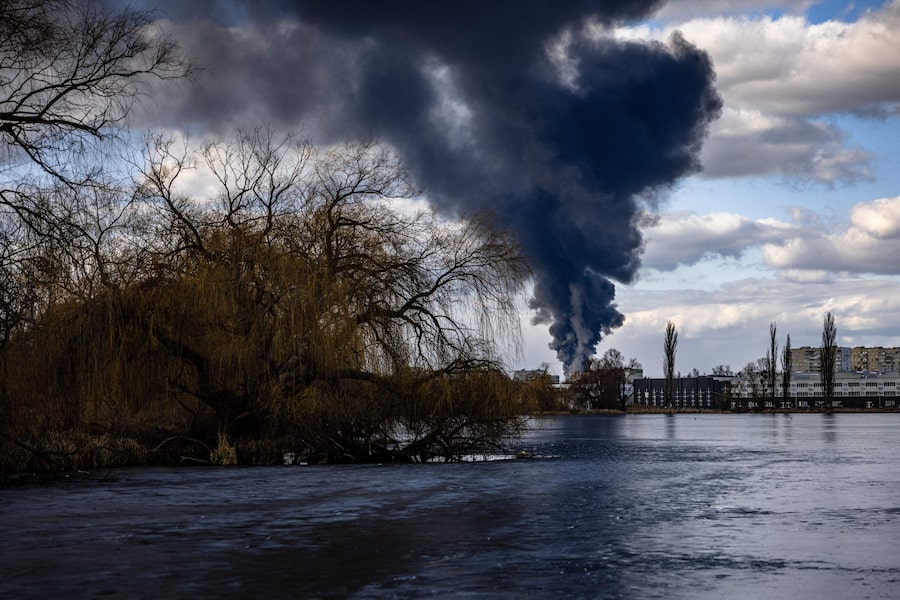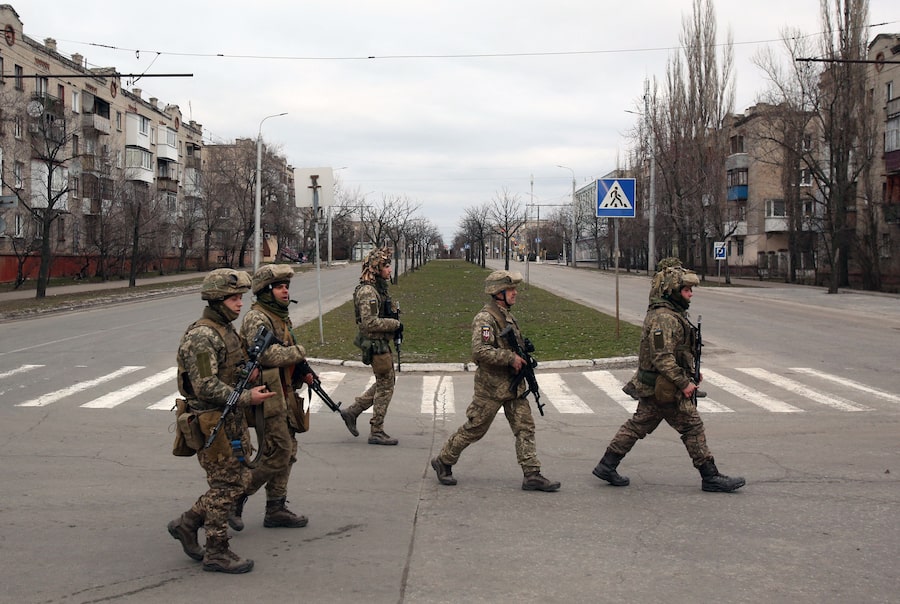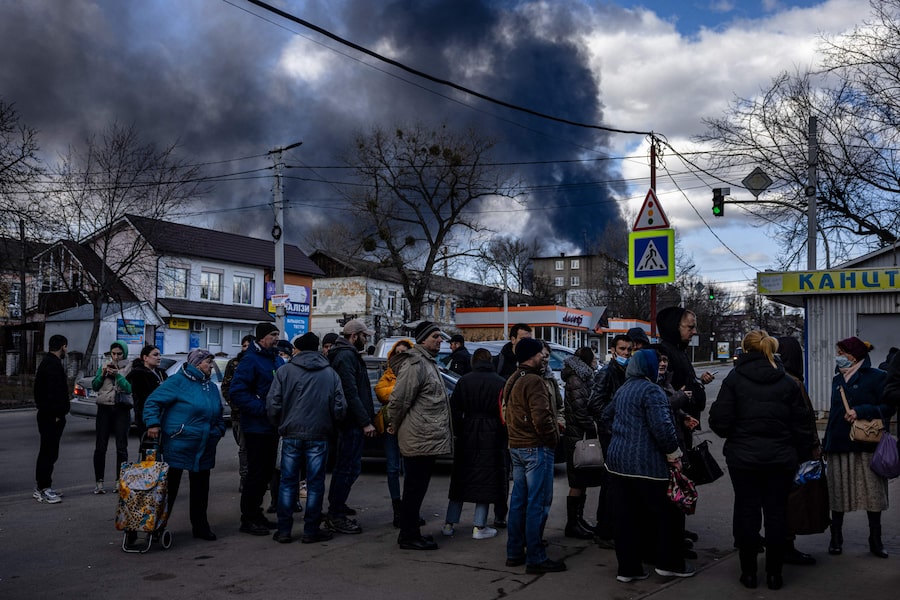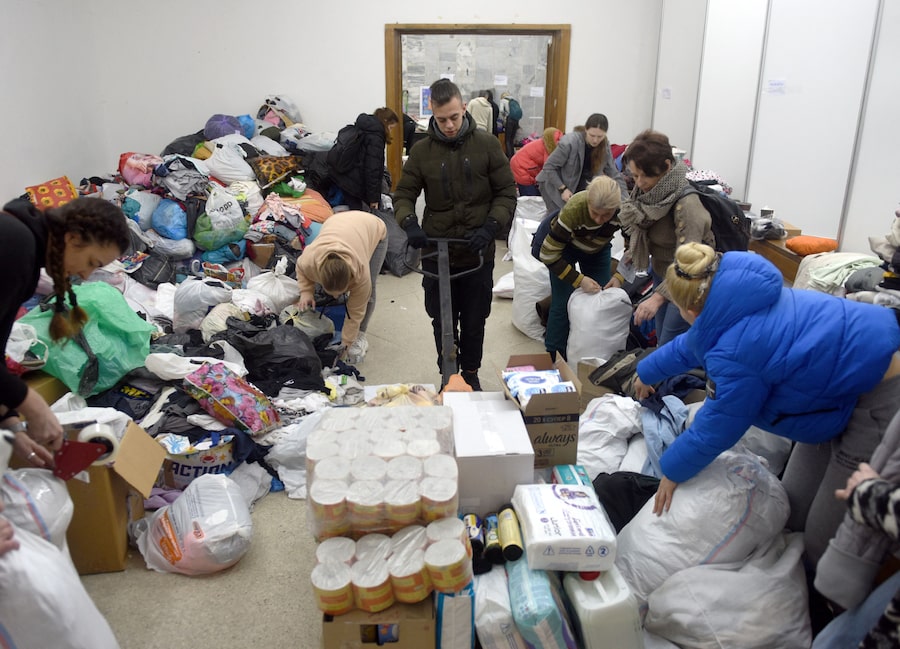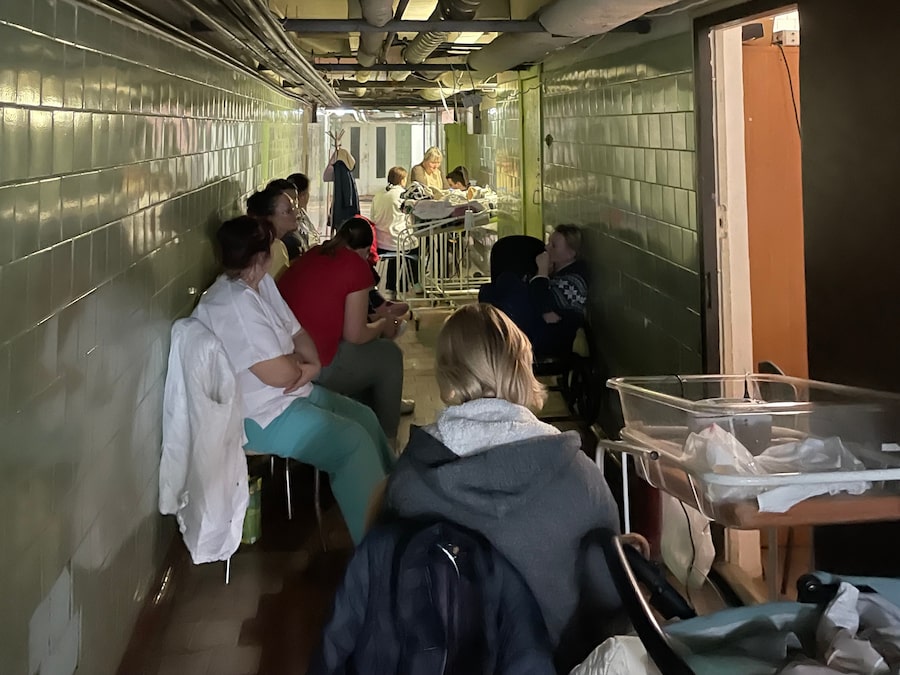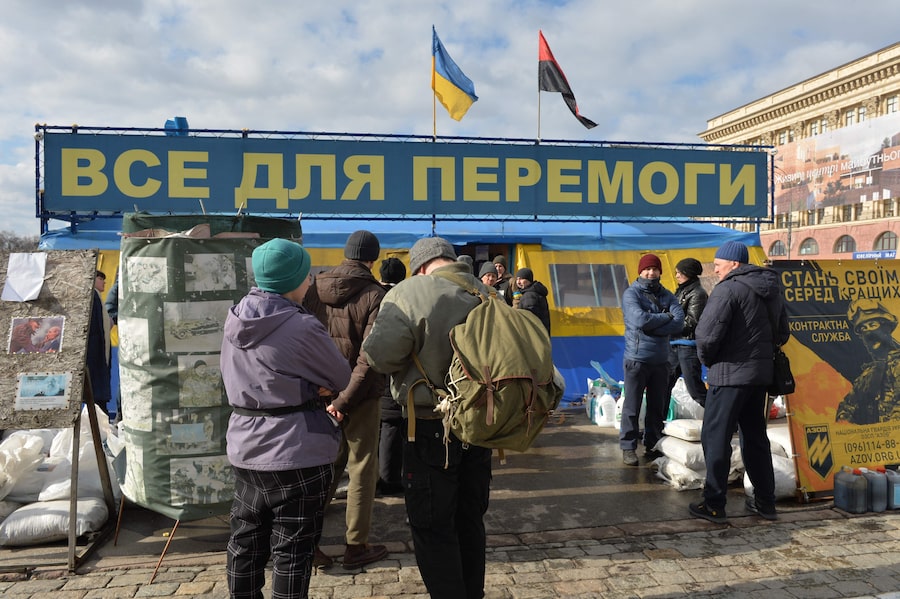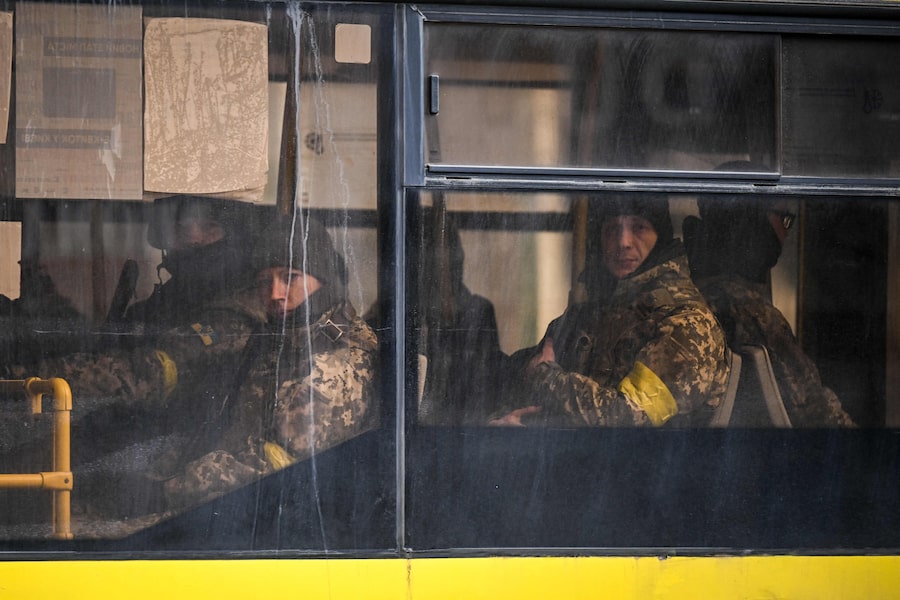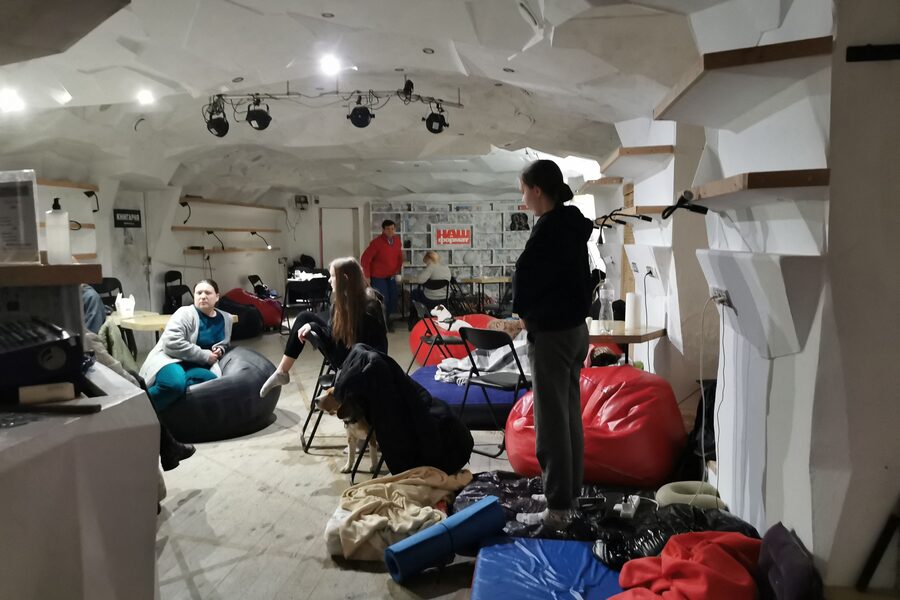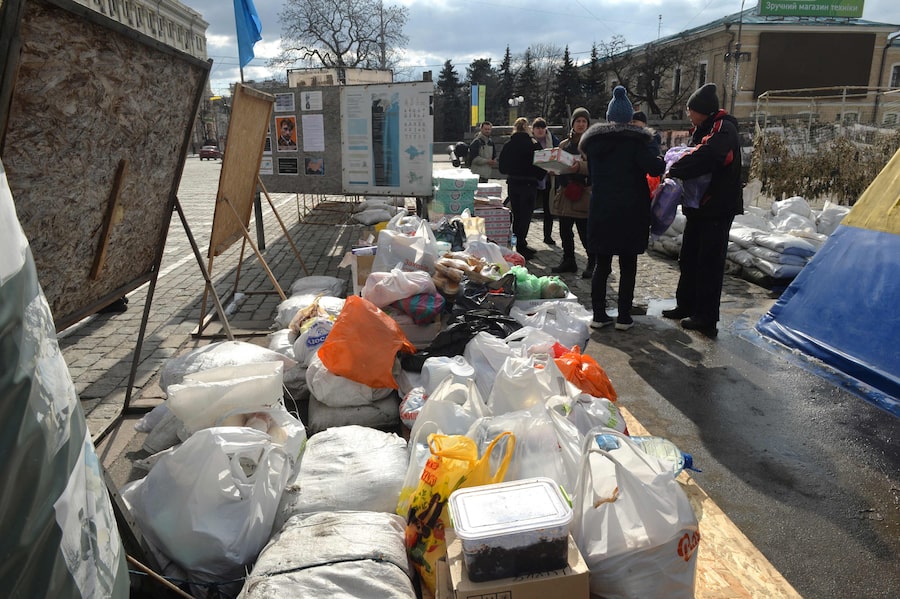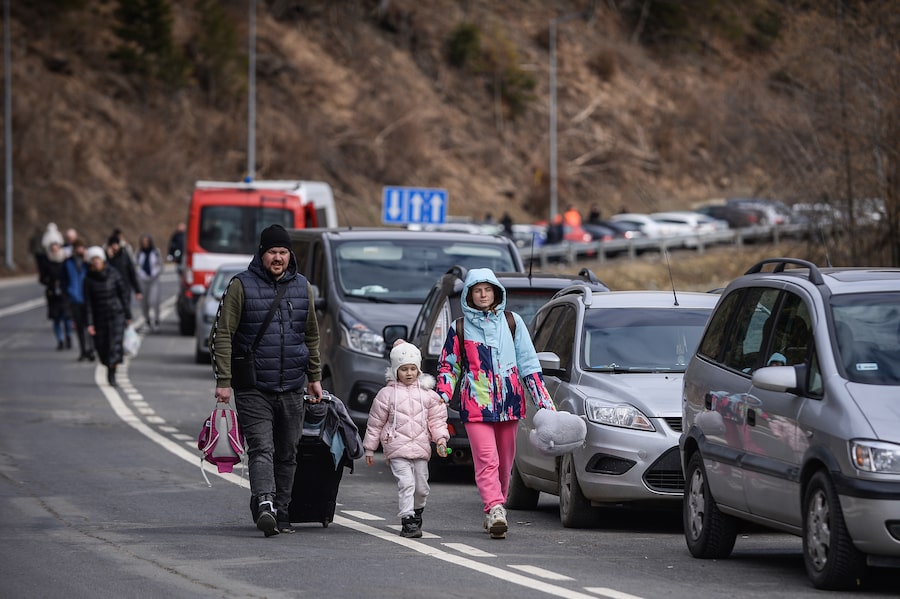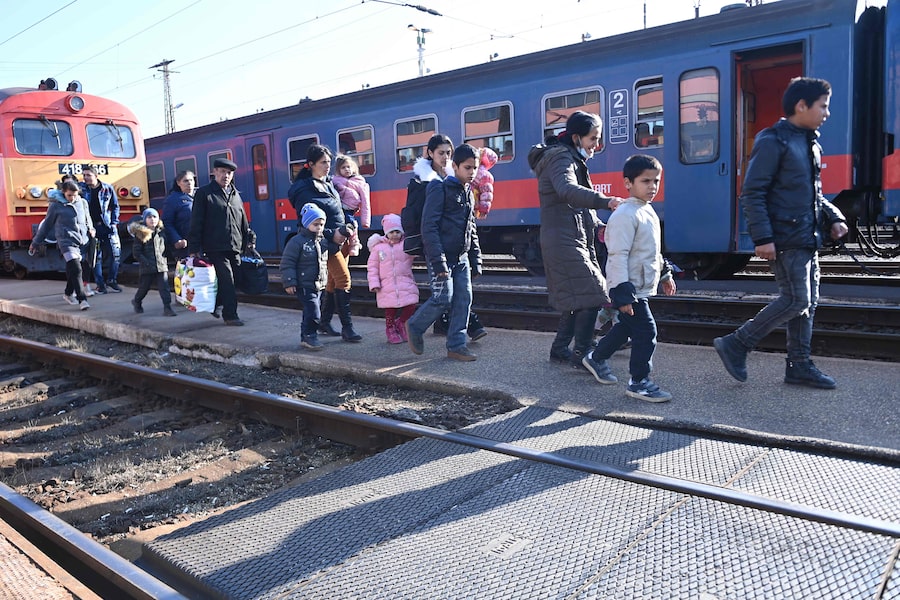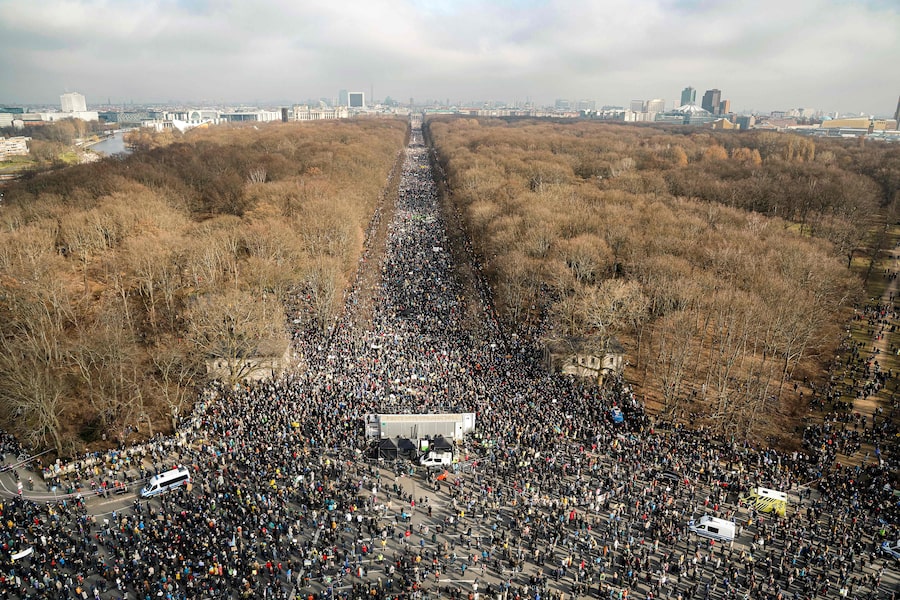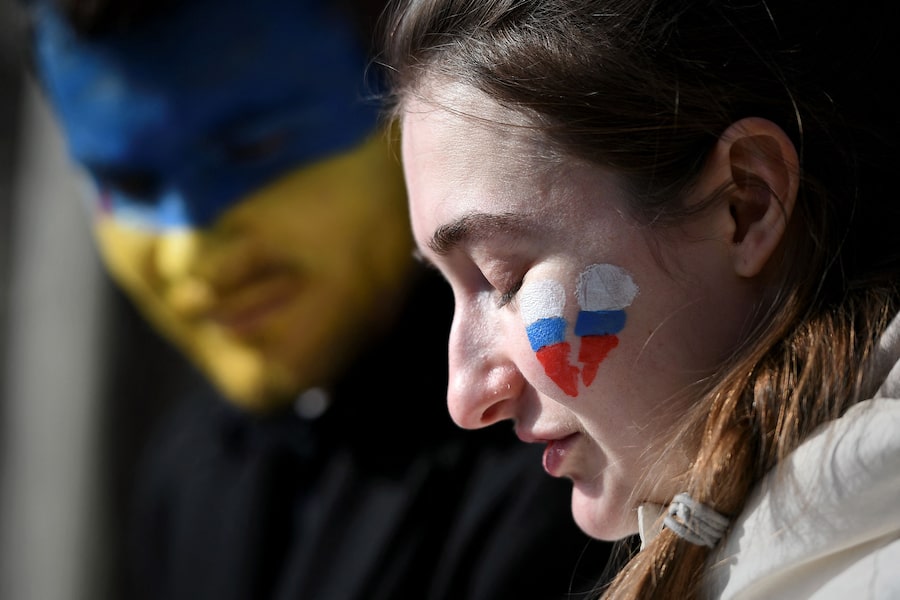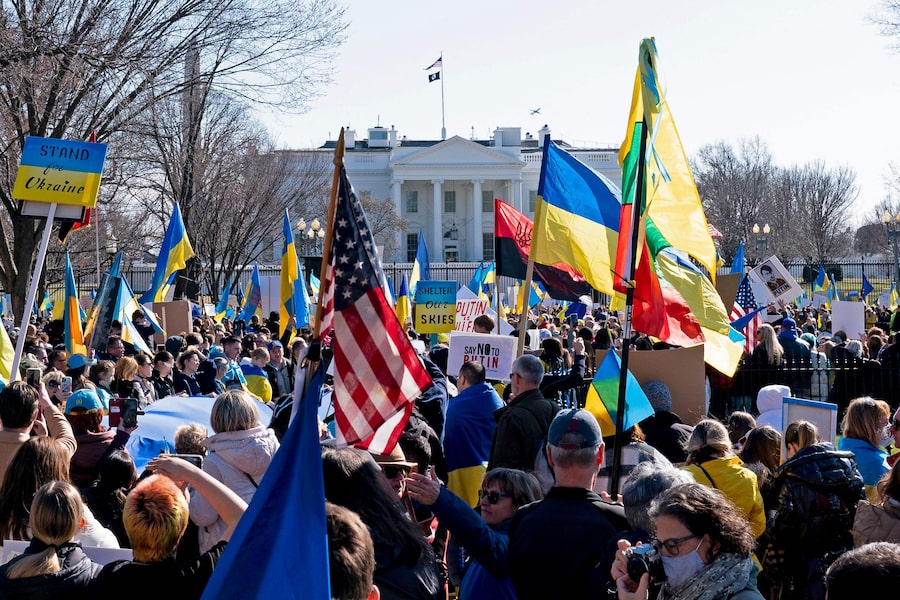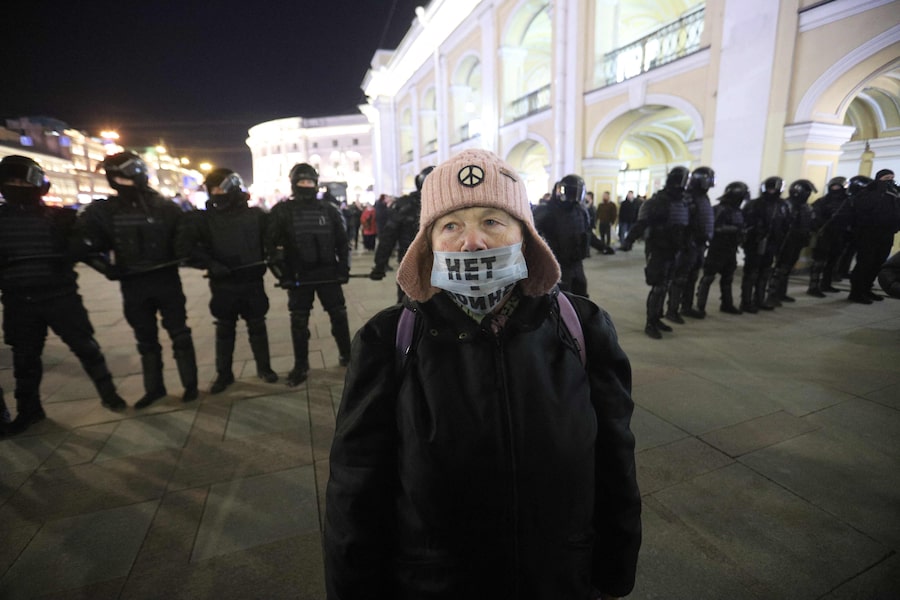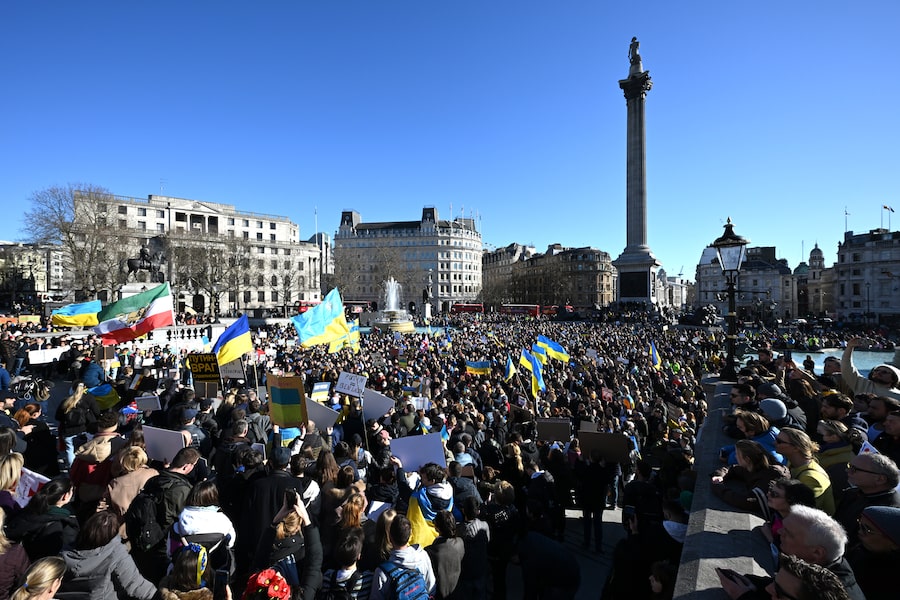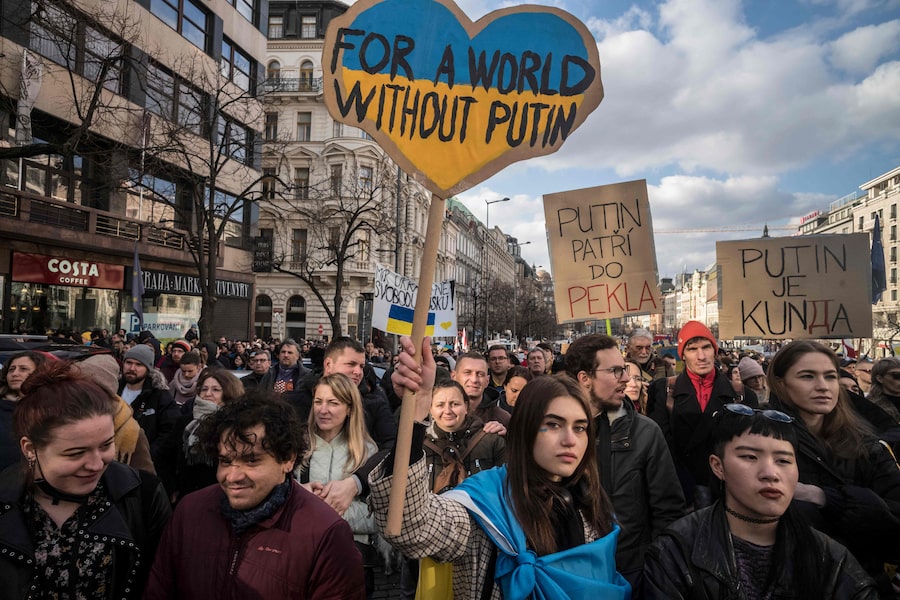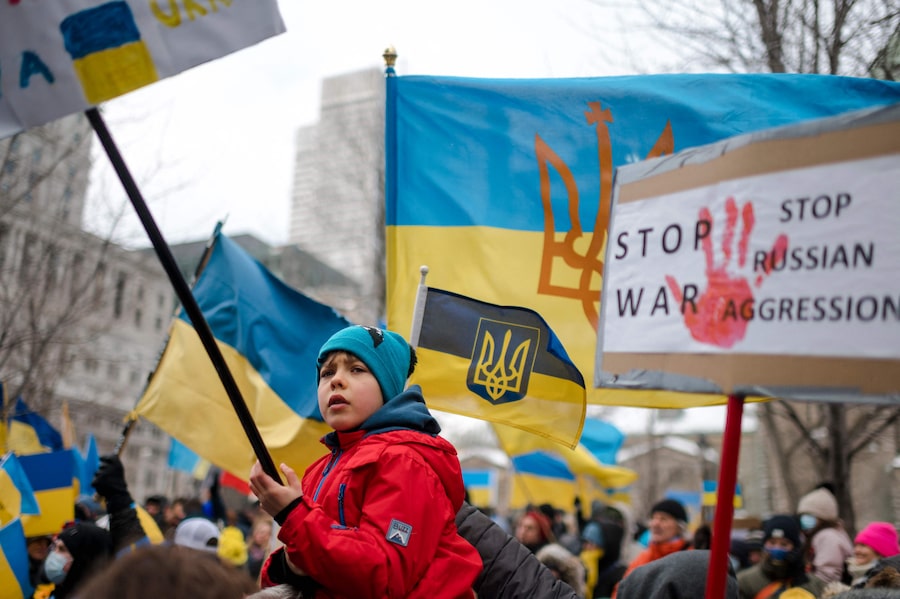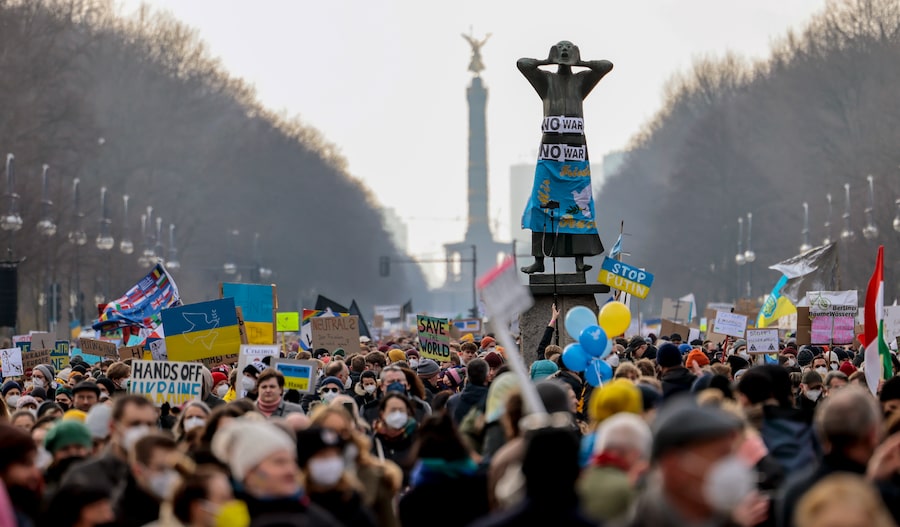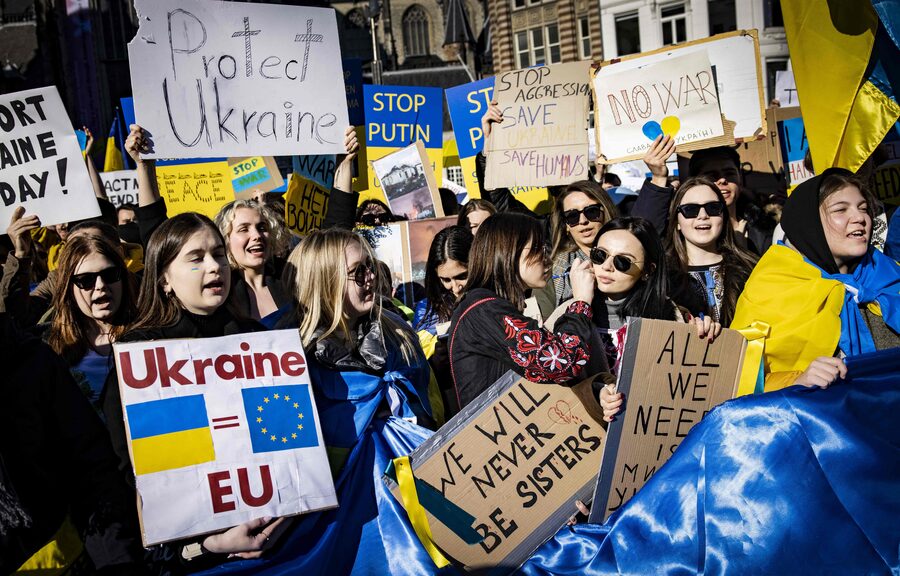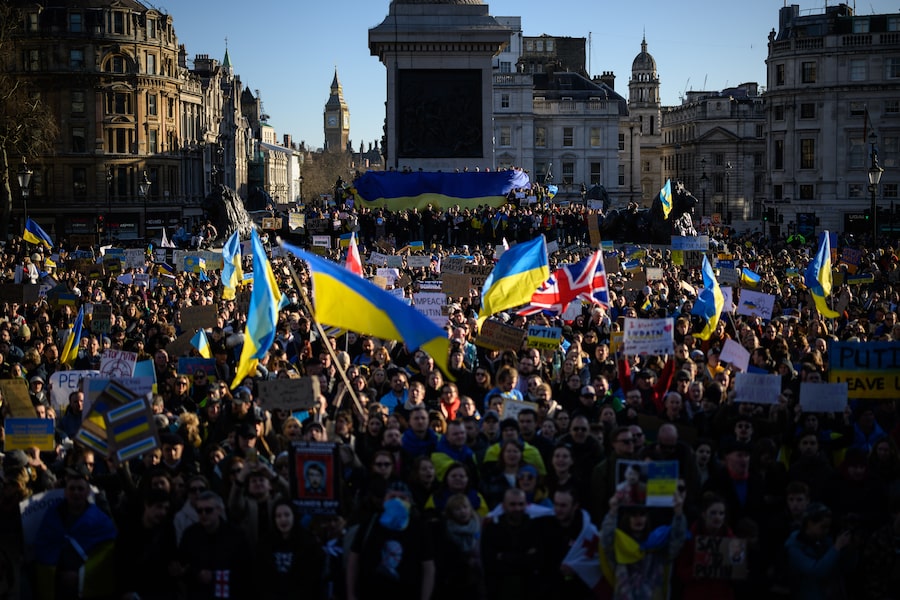This digest has now been archived. Find the latest Russia-Ukraine updates here.
A person fleeing the Russian invasion of Ukraine walks wrapped in a blanket during a snowfall at a temporary camp in Przemysl, Poland, Feb. 28, 2022.YARA NARDI/Reuters
Russia has invaded Ukraine. Here are the latest updates:
- Russian President Vladimir Putin put his country’s nuclear forces on their highest level of alert on high alert, citing aggressive statements by NATO and economic sanctions. Air strikes and cruise missiles pounded Kyiv early Sunday as more Russian troops closed in on the capital city. Gunfire near Kyiv’s Okhmadyt children’s hospital reportedly killed a young girl, and wounded five others, including two children.
- Russian and Ukrainian forces battle in the streets of the northeastern city of Kharkiv.
- Canadian broadcasters are pulling Russian state-funded television channel RT from their lineups. Canada and the European Union are closing their airspace to all Russian aircraft operators. Major sports figures in the Western world are voicing their opposition to the war, and governments announced new sanctions on Russia, targeting the country’s central bank.
- Moldova is vowing to seek closer ties with Europe despite fears the move might provoke Russia.
- Africans and Asians fleeing Ukraine are facing racial discrimination by border guards. Some Ukrainian men and women are returning home to help defend their homeland.
- Canada’s Foreign Affairs Minister Mélanie Joly says it’s up to individual Canadians to decide whether they want to travel to Ukraine to help fight the Russian invasion.
Opinion:
- To catch up on Globe opinion pieces, read Cathal Kelly’s view that Russians in the sports world are doing PR for Putin’s war machine.
- Doug Saunders writes on German Chancellor Olaf Scholz’s “180-degree turn” in military and foreign policy.
- David Parkinson also touches on while the loudest judgment of Russia’s invasion has been the stock market, it’s probably also the least accurate.
It has been three days now since Putin launched the Russian assault, and while much is still unknown about his final military objectives, we have a clearer timeline of how the chaotic first 72 hours unfolded. Here are The Globe’s compendiums of chronological maps and important photographs, and a continuing explainer about why and how the invasion began.
To learn what you can do for Ukrainians, consult our how-to-help guide. For more updates, visit our list of Globe foreign correspondents and other journalists to follow on Twitter.
This is Sunday’s live update file. Follow today’s news here
3:35 a.m. ET
EU defence ministers to meet to coordinate arms deliveries to Ukraine
European Union defence ministers will meet virtually later on Monday to coordinate their assistance for Ukraine after the bloc decided for the first time to jointly fund weapons and send them to Kyiv, EU foreign policy chief Josep Borrell said on Twitter.
“We will discuss further urgent needs and coordinate our assistance, with help of the clearing house managed by the EU military staff,” Borrell said.
On Sunday, the EU announced it would tighten sanctions on Russia, ban Russian state-owned television network Russia Today and news agency Sputnik and fund weapons for Ukraine to help it defend itself against Russia’s invasion.
-Reuters
3:04 a.m. ET
Ukraine says world’s largest plane damaged
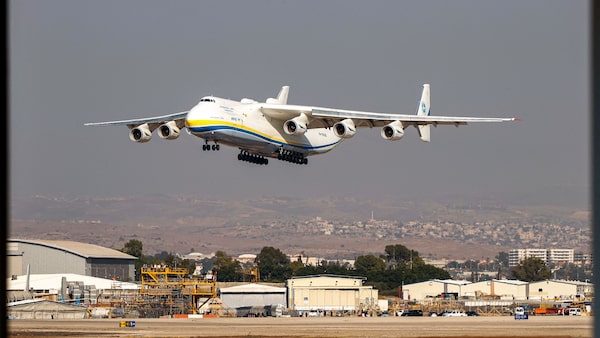
(FILES) This file photo taken on August 03, 2020 shows a view of the Soviet-built Antonov Airlines Antonov An-225 Mriya strategic airlift cargo aircraft, the world's largest cargo plane.JACK GUEZ/AFP/Getty Images
Ukraine’s defense industry conglomerate says the world’s largest plane that was in regular operation was heavily damaged in fighting with Russian troops at the airport outside Kyiv where it was parked.
The Ukroboronprom company said in a statement that the Antonov-225 was “destroyed” but would be repaired. The An-225, which is operated by Ukroboronprom’s subsidiary Antonov Airlines, is used to move exceptionally large cargos. Its arrivals and departures at overseas airports often attract aviation buffs to observe the lumbering plane with a 290-foot (84-meter) wingspan.
Only two planes have been built with larger wingspans — the Stratolaunch and the Hughes “Spruce Goose” — but each was used only for a single flight.
-The Associated Press
2:52 a.m. ET
Vatican says ready to ‘facilitate dialogue’ between Russia and Ukraine
The Vatican said on Monday it was ready to “facilitate dialogue” between Russia and Ukraine to end the war, and called for an immediate stop to the “military attack”.
Secretary of State Cardinal Pietro Parolin, who ranks second only to the pope in the Vatican hierarchy, told Italian newspapers that “despite the war unleashed by Russia against Ukraine” he was “convinced there is always room for negotiations”.
Ukraine’s ambassador to the Vatican, Andriy Yurash, told Reuters in an interview on Feb. 14 that Kyiv was open to a Vatican mediation of its conflict with Russia, calling the Vatican a “very influential, very spiritual place for a meeting”.
Parolin, the Vatican’s top diplomat, told Italian newspapers that dialogue was the only “reasonable and constructive” way to work out differences.
-Reuters
2:33 a.m. ET
Russian central bank hikes rates, scrambles to limit fallout of tough sanctions
Russia’s central bank on Monday sharply raised its key policy rate to 20%, a day after announcing a slew of measures to support domestic markets, as it scrambled to manage the fallout of harsh Western sanctions in retaliation against Moscow’s invasion of Ukraine.
The bank hiked the key rate from 9.5% to counter risks of rouble depreciation and higher inflation, and also ordered companies to sell 80% of their foreign currency revenues.
“External conditions for the Russian economy have drastically changed,” the central bank said in a statement, adding that the rate hike ‘will ensure a rise in deposit rates to levels needed to compensate for the increased depreciation and inflation risk.”
Monday’s steps bolster other measures announced on Sunday, which include the central bank’s assurance that it would resume buying gold on the domestic market, launch a repurchase auction with no limits and ease restrictions on banks’ open foreign currency positions.
-Reuters
2:26 a.m. ET
UK says Russian advance on Kyiv slowed by staunch Ukrainian resistance
Russia’s advance on Kyiv has been slowed by logistical failures and fierce Ukrainian resistance, Britain’s defence ministry said on Monday.
“The bulk of [President Vladimir] Putin’s ground forces remain more than 30km to the north of Kyiv their advance having been slowed by Ukrainian forces defending Hostomel airfield, a key Russian objective for day one of the conflict,” the ministry said.
“Logistical failures and staunch Ukrainian resistance continue to frustrate the Russian advance.”
Heavy fighting continues around Chernihiv, a city in northern Ukraine, and the northeastern city of Kharkiv, the defence ministry said in an intelligence update posted on Twitter. Both cities remain under Ukrainian control, it said.
-Reuters
1:35 a.m. ET
UK says it will target Russian central bank
Britain said on Monday it was taking further measures against the Russia in concert with the United States, and European Union, prohibiting any British entities from undertaking transactions with the Russian central bank, finance ministry and wealth fund.
“The UK Government will immediately take all necessary steps to bring into effect restrictions to prohibit any UK natural or legal persons from undertaking financial transactions involving the CBR, the Russian National Wealth Fund, and the Ministry of Finance of the Russian Federation,” the government said.
Britain said there would be more designations announced this week.
“These measures demonstrate our determination to apply severe economic sanctions in response to Russia’s invasion of Ukraine,” finance minister Rishi Sunak said.
“The Bank of England continues to take any and all actions needed to support the Government’s response to the Russian invasion of Ukraine,” Bank of England Governor Andrew Bailey said.
-Reuters
12:54 a.m. ET
Russian airline Aeroflot crosses into Canada’s airspace despite ban
Despite Canada’s decision to close its airspace to Russian aircraft, a Russia-bound aircraft crossed into Canadian airspace a few hours later – a mistake that the federal government pinned on the non-profit agency that monitors Canada’s airspace.
Aeroflot 111, which travels between Miami and Moscow, crossed into airspace over Quebec at about 6 p.m.
In a statement, a spokesperson for Mr. Alghabra said that Nav Canada – the privately run, non-profit corporation that monitors air traffic in Canadian airspace – allowed the flight to pass.
“NavCan mistakenly permitted a banned aircraft into Canadian airspace. This shouldn’t have happened,” Valérie Glazer, the spokesperson, said in an e-mailed statement.
Mr. Alghabra will be meeting with its chief executive officer to understand why the flight was permitted entry, she said. “Canadian airspace remains closed to Russian planes.”
(1/2) We are aware that Aeroflot flight 111 violated the prohibition put in place earlier today on Russian flights using Canadian airspace.
— Transport Canada (@Transport_gc) February 28, 2022
In an e-mailed statement, a spokesperson for Nav Canada said that Aeroflot declared that flight 111 was a “humanitarian flight,” as it crossed into Canadian airspace. Such a declaration requires “special handling” by air traffic controllers, Nav Canada’s Jonathan Bagg said in the statement, and after making it, the aircraft continued unimpeded.
Mr. Bagg said Nav Canada will co-operate with Transport Canada’s investigation. The navigation service said it is also working with other countries’ navigation agencies to ensure Russian aircrafts are re-routed before they are near Canadian airspace. In the case of Aeroflot 111, it passed over Maine before flying over Eastern Quebec.
- Greg McArthur and Marieke Walsh
12:30 a.m. ET
IOC, IPC asked to suspend Russia, Belarus
Athletes from Ukraine and other nations have called on the International Olympic Committee to suspend Russia and Belarus and ban their athletes from events immediately.
“Russia’s invasion of Ukraine, supported by Belarus, is a clear breach of the Olympic and Paralympic Charters - a breach that must be met with strong sanctions,” the athletes said in an open letter to IOC president Thomas Bach and International Paralympic Committee chief Andrew Parsons.
The letter, released by the Global Athlete movement, which aims to empower athletes, said that Ukrainian sportspeople and their families in the country were in “grave danger” and it had been a challenge to speak to them as they were in bomb shelters.
It added that refusing to take swift action and suspend the National Olympic Committees of Russia and Belarus would send the wrong message.
“Your lack of action will send a message to every athlete in the world that you have chosen Russia and Belarus interests over athlete interests. Your legacy will be defined by your actions,” the letter said.
The letter received widespread support, including from British former marathon runner Paula Radcliffe and Canadian former cross-country skier Beckie Scott.
The IOC has said international sports federations should either move or cancel sports events currently planned in Russia or Belarus, while the IOC’s executive said Russian and Belarusian national flags should not be displayed at international sports events.
- Reuters
12:23 a.m. ET
Meta says Ukraine’s military, politicians targeted in hacking campaign on Facebook
Meta Platforms said a hacking group used Facebook to target a handful of public figures in Ukraine, including prominent military officials, politicians and a journalist, amid Russia’s ongoing invasion of the country.
Meta said in the last 48 hours it had also separately removed a network of about 40 fake accounts, groups and pages across Facebook and Instagram that operated from Russia and Ukraine targeting people in Ukraine, for violating its rules against coordinated inauthentic behavior.
A Twitter spokesperson said it had also suspended more than a dozen accounts and blocked the sharing of several links for violating its rules against platform manipulation and spam. It said its ongoing investigation indicated the accounts originated in Russia and were attempting to disrupt the public conversation around the conflict in Ukraine.
- Reuters
12:15 a.m. ET
Belarus may join Ukraine invasion, U.S. official says
A senior U.S. intelligence official says Belarus is expected to send troops into Ukraine as soon as Monday to fight alongside Russian forces that invaded Ukraine last week.
Belarus has been providing support for Russia’s war effort, but so far has not taken a direct part in the conflict.
The American official has direct knowledge of current U.S. intelligence assessments and says the decision by Belarus’ leader on whether to bring Belarus further into the war depends on talks between Russia and Ukraine happening in the coming days. The official spoke anonymously to discuss the sensitive information.
Russian forces have encountered strong resistance from Ukraine defenders, and U.S. officials say they believe the invasion has been more difficult, and slower, than the Kremlin envisioned, though that could change as Moscow adapts.
12:00 a.m. ET
Russia restricts access to Facebook
Russia has apparently rendered Facebook largely unusable across leading Russian telecommunications providers amid rising friction between Moscow and the social media platform.
The London-based internet monitor NetBlocks reports that Facebook’s network of content-distribution servers in Russia was so badly restricted Sunday that “content no longer loads, or loads extremely slowly making the platforms unusable.
”Russian telecoms regulator Roskomnadzor on Friday announced plans to “partially restrict” access to Facebook. That same day, Facebook’s head of security policy had said the company was barring Russian state media from running ads or otherwise profiting on its platform anywhere in the world. Facebook says it has also refused a request by the Kremlin not to run fact checks related to Russia’s invasion of Ukraine on the platform for users inside Russia.
- Associated Press
11:20 p.m. ET
Rouble tumbles to record low
The Russian rouble tumbled to a record low against the dollar on Monday, after Western nations announced a harsh set of sanctions over the weekend to punish Russia for its invasion of Ukraine, including curbs on the country’s currency reserves.
The rouble fell as far as 119.50 per dollar in Asian trading, a record low for the currency and a steep drop of 30% from Friday’s close. It subsequently recovered to around 110 per dollar.
Russia’s central bank (CBR) announced a slew of measures on Sunday to support domestic markets, as it scrambled to manage the fallout of the sanctions that will block some banks from the SWIFT international payments system.
- Reuters
The iconic Horseshoe Falls are lit in the colours of the Ukrainian flag, following the Russian invasion in Ukraine, in Niagara Falls, Ontario, Canada February 27, 2022.NICK IWANYSHYN/Reuters
11:00 p.m. ET
Shaw joins Bell, Rogers in booting RT from lineup
Shaw said on Twitter late Sunday that, effective Monday, it will no longer be carrying the network, adding, “Customers who subscribe to RT as a pick and pay service will receive a credit in their next billing cycle.”
-Alexandra Posadzki
10:45 p.m. ET
Kyiv radioactive waste disposal site hit by missiles
The United Nations’ nuclear watchdog says missiles have hit a radioactive waste disposal site in the Ukrainian capital of Kyiv, but there are no reports of damage to the buildings or indications of a release of radioactive material.
In a statement late Sunday, International Atomic Energy Agency Director General Rafael Grossi says Ukrainian authorities informed his office about the overnight strike. He says his agency expects to soon receive the results of on-site radioactive monitoring.
The report came a day after an electrical transformer at a similar disposal facility in the Ukrainian city of Kharkiv was damaged. Such facilities typically hold low-level radioactive materials such as waste from hospitals and industry, but Grossi says the two incidents highlight a “very real risk.” He says if the sites are damaged there could be “potentially severe consequences for human health and the environment.”
- Associated Press
10:00 p.m. ET
Google disables Google Maps live traffic data in Ukraine
Alphabet Inc.’s Google confirmed on Sunday it has temporarily disabled for Ukraine some Google Maps tools which provide live information about traffic conditions and how busy different places are.
The company said it had taken the action of globally disabling the Google Maps traffic layer and live information on how busy places like stores and restaurants are in Ukraine for the safety of local communities in the country, after consulting with sources including regional authorities.
- Reuters
9:00 p.m. ET
Satellite images show Russian convoy of ground forces moving toward Kyiv
Satellite imagery taken on Sunday showed a large deployment of Russian ground forces including tanks moving in the direction of the Ukrainian capital Kyiv from approximately 64 km away, a private U.S. company said.
The images released by Maxar Technologies Inc showed a deployment comprised of hundreds of military vehicles and extending more than 5 km, Maxar said.
The convoy was situated northeast of the Ukrainian city of Ivankiv and contained fuel, logistics and armored vehicles including tanks, infantry fighting vehicles and self-propelled artillery, it said.
The satellite images also showed damage caused by recent airstrikes on the Antonov airport in Hostomel, and heavy fighting in and near the airport, Maxar reported.
- Reuters
A satellite image shows Russian ground forces northeast of Ivankiv heading in the direction of Kyiv, Ukraine, February 27, 2022.Satellite image ©2022 Maxar Tec/Reuters
7:45 p.m. ET
Africans and Asians fleeing Ukraine subjected to racial discrimination by border guards
Gifty Naana Mensah has been studying medicine at a university in Ternopil, in western Ukraine, for five years. She had never experienced any racism until she tried to escape the Russian invasion.
Ms. Mensah, who is from Ghana, managed to get from Ternopil to the Polish-Ukrainian border on Friday only to discover that Africans were being forced to wait while Ukrainians crossed first. She spent nearly two days in line, with little water and nothing to eat.
“To be honest, there was a lot of racism,” Ms. Mensah, 23, said Sunday shortly after arriving in Przemysl, a small city in eastern Poland that is close to the border. “Because the Ukrainians always came first, even though we Africans would be there for days and sometimes three days with no food. Everyone was just exhausted. Any time Ukrainians came, they told us to go back. They were shouting at us, ‘go back.’ It was really crazy.”
She is among the more than 150,000 people who have crossed into Poland since the Russian attack began last week. The country is bracing for up to one million refugees from Ukraine as the crisis unfolds. So far, most of the people arriving, including Africans, have moved on to other parts of the European Union. But aid agencies warn that future waves of asylum seekers may have no option but to remain in Przemysl after making the torturous journey to the frontier.
While it’s not clear how many people pouring into Poland are from Africa or other parts of the world, tens of thousands of Africans are studying at Ukrainian universities, which many of them see as much more affordable than other foreign universities. There are more than 16,000 students in Ukraine from Nigeria, Morocco and Egypt alone, according to Ukrainian statistics.
- Paul Waldie and Geoffrey York
5:30 p.m. ET
Canadians can decide if they wish to join the Ukrainian foreign legion to fight Russia, Joly says
Foreign Affairs Minister Mélanie Joly says it’s up to individual Canadians to decide whether they want to travel to Ukraine to help Kyiv fight the Russian invasion.
As Moscow’s forces are laying siege to Kyiv, Ukrainian President Volodymyr Zelensky announced the formation of a foreign “international legion” of volunteers to defend Ukraine.
Ms. Joly in a news conference on Sunday reiterated that the government has warned against travelling to Ukraine because of the insecurity there. But she says it’s up to Canadians if they want to join the fight.
“We understand that people of Ukrainian descent want to support their fellow Ukrainians and also that there is a desire to defend the Motherland and in that sense it is their own individual decision,” Ms. Joly said. “Let me be clear: we are all very supportive of any form of support to Ukrainians right now.”
On Sunday, Canada announced it would be sending $25-million in non-lethal gear to Ukraine. Ms. Joly said this includes helmets, body armour, gas masks and night-vision goggles.
And Defence Minister Anita Anand said more weapons shipments to Ukraine are “not off the table.” Canada recently shipped $7.8-million in lethal aid to Ukraine.
- Steven Chase
4:30 p.m. ET
Western sports world derides Russia’s invasion of Ukraine
As the Russian government presses on with its military invasion of Ukraine, major sports figures in the Western world are voicing their opposition to the war, and the ownership and sponsorship deals of some teams are being called into question.
On Saturday, Canadian hockey legend Wayne Gretzky condemned the invasion and said Russia should be banned from the rescheduled world junior championship, to be held in Alberta this summer.
The International Ice Hockey Federation said it is reviewing the implication of Russia’s invasion on its events and called a council meeting for Monday.
FIFA committed to punitive actions on Sunday, saying the Russian flag and anthem will not be allowed in soccer games, and no international games will be allowed to take place in the country. The sport’s world governing body said it’s aware that Poland and Sweden have refused to play games with Russia in the coming World Cup qualifying matches, and said it is working to find an appropriate solution.
Other soccer bodies have already taken action against Russia: European soccer’s governing body last week stripped St. Petersburg of this year’s Champions League final, and Sunday, England’s soccer federation said it would not play Russia in any international games for the foreseeable future “out of solidarity with Ukraine and to wholeheartedly condemn the atrocities being committed by the Russian leadership.”
But experts say the rebuke of war from major athletes overseas will be another factor that could affect Russian public perception about the military action in Ukraine.
- Salmaan Farooqui
- Also read Cathal Kelly’s column: Russians in the sports world are doing PR for Putin’s war machine
3:45 p.m. ET
Russia’s invasion of Ukraine kills 352 civilians, including 14 children, health ministry reports
LVIV, Ukraine - Ukraine’s health ministry said on Sunday that 352 civilians, including 14 children, had been killed since the beginning of Russia’s invasion of Ukraine.
It also said that 1,684 people, including 116 children, had been wounded.
- Reuters
Police detained more than 2,000 people at anti-war protests held in 48 cities across Russia on Sunday, a protest monitoring group said, as people defied the authorities to show their anger over Russia’s invasion of Ukraine.
The Globe and Mail
2:25 p.m. ET
Anti-war protests break out as Belarus votes to renounce non-nuclear status
MINSK - Protesters took to the streets as Belarus held a referendum on Sunday to adopt a new constitution that would ditch its non-nuclear status at a time when the country has become a launchpad for Russian troops invading Ukraine.
The vote, almost certain to pass under the tightly controlled rule of President Alexander Lukashenko, could see nuclear weapons on Belarusian soil for the first time since the country gave them up after the fall of the Soviet Union.
It raises the stakes at a time when Lukashenko has fallen behind Russian President Vladimir Putin’s military assault on Ukraine after earlier playing an intermediary role between the two neighbours.
The referendum sparked anti-war protests in several cities, as people chanted “no to war”, cars blared their horns in solidarity, and people laid bunches of flowers in the yellow and blue colours of the Ukrainian flag. At least 290 people were detained, rights activists said.
On Sunday, speaking at a polling station, Lukashenko said that he could ask Russia to return nuclear weapons to Belarus.
“If you (the West) transfer nuclear weapons to Poland or Lithuania, to our borders, then I will turn to Putin to return the nuclear weapons that I gave away without any conditions,” Lukashenko said.
In videos and photos posted on social media, people gathered at polling stations in Minsk and other cities in Belarus to protest.
The West has already said it will not recognize the results of the referendum, which is taking place against the background of the sweeping crackdown on domestic opponents of the government. According to human rights activists, as of Sunday, there were more than a thousand political prisoners in Belarus.
-Reuters
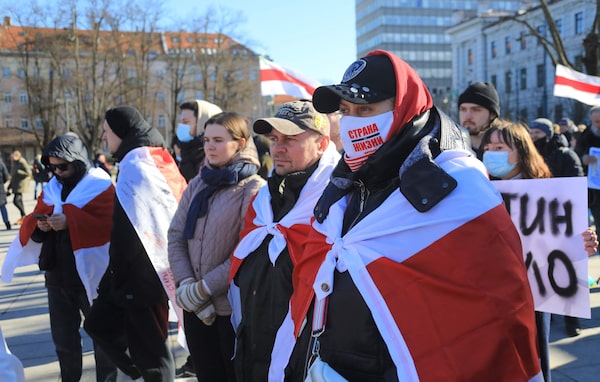
Protesters took to the streets as Belarus held a referendum on Sunday to adopt a new constitution that would ditch its non-nuclear status at a time when the country has become a launchpad for Russian troops invading Ukraine.PETRAS MALUKAS/AFP/Getty Images
12:30 p.m. ET
Biden administration to push congress for $6.4 billion in aid to Ukraine - Schumer
WASHINGTON - The Biden Administration will ask Congress for $6.4-billion in economic and military aid to help Ukraine as it fights the Russian invasion, Democratic Senate Majority Leader Chuck Schumer said on Sunday.
Schumer said the request would be added to a spending bill expected to reach the Senate floor next week.
-Reuters
12:25 p.m. ET
Sweden to send military aid to Ukraine, Prime Minister Andersson says
Sweden will send military aid to Ukraine, including anti-tank weapons, helmets and body armour, Prime Minister Magdalena Andersson said on Sunday.
“Sweden is now proposing direct support for Ukraine’s armed forces. It includes 135,000 field rations, 5,000 helmets, 5,000 body shields and 5,000 anti-tank weapons,” Andersson told a news conference.
Reuters
12:17 pm. ET
Putin’s nuclear move could make situation ‘much, much more dangerous,’ U.S. official says
WASHINGTON - Russian President Vladimir Putin’s order to put Russian nuclear forces on high alert during his invasion of Ukraine is an escalation that could make things “much, much more dangerous,” a senior U.S. defense official said on Sunday.
Putin gave the order as Washington assesses that Russian forces are suffering unexpected battlefield setbacks in their four-day-old invasion due to stiff Ukrainian resistance and planning failures that have left some units without fuel or other supplies, U.S. officials said.
The Pentagon learned of the heightened Russian alert from Putin’s televised announcement, the senior U.S. defense official said, instead of from American intelligence sources.
Just after Putin spoke, Defense Secretary Lloyd Austin, General Mark Milley, chairman of the Joint Chiefs of Staff, and the top U.S. commander for Europe, General Tod Wolters, held a pre-scheduled meeting at 8:30 a.m. at which they discussed the Russian president’s decision.
Although Washington was still gathering information, Putin’s move was troubling, the official said, speaking on condition of anonymity.
“It’s clearly, essentially, putting in play forces that, if there’s a miscalculation, could make things much, much more dangerous,” the official said.
Asked whether the United States would continue to provide military assistance to Ukraine following Putin’s announcement, the official said: “That support is going to go forward.”
-Reuters
Servicemen of pro-Russian militia and separatist self-proclaimed Luhansk People's Republic (LNR) hoist Russian flags outside the Oschad bank branch in Stanytsia Luhanska, in the Luhansk region, on Feb. 27ALEXANDER ERMOCHENKO/Reuters
11:45 a.m. ET
EU to close airspace to Russia, curb media, target Belarus
BRUSSELS - The European Union will tighten sanctions on Russia, target Russian ally Belarus with measures and fund weapons for Ukraine to help it defend itself against Russia’s invasion, top EU officials said on Sunday.
“For the first time ever, the European Union will finance the purchase and delivery of weapons and other equipment to a country that is under attack, European Commission President Ursula von der Leyen said.
She said the European Union would close its airspace to Russian aircraft, including the private jets of Russian oligarchs.
The bloc will ban Russian state-owned television network Russia Today and news agency Sputnik. Von der Leyen said this was to render them unable to “spread their lies to justify Putin’s war and to sow division in our Union.”
For Russian ally Belarus, the European Union will impose a ban on imports of products from mineral fuels to tobacco, wood and timber, cement, iron and steel.
These come on top of a series of sanctions on Russia already unveiled, such as on its energy sector and the exclusion of certain Russian banks from the SWIFT messaging system that dominates global payments.
The European Union will also finance the purchase and delivery of weapons and other equipment to Ukraine.
“Another taboo has fallen. The taboo that the European Union was not providing arms in a war,” EU foreign policy chief Josep Borrell said in a statement before a meeting of EU foreign ministers.
The bloc aims to spend €450-million (US$507-million) of EU funds on weapons for Ukraine, a Commission source told Reuters, and a further €50-million on items such as medical supplies.
-Reuters
10:44 a.m. ET
Turkey to implement pact limiting Russian warships to Black Sea
ISTANBUL - NATO member Turkey changed its rhetoric to call Russia’s assault on Ukraine a “war” on Sunday and pledged to implement parts of an international pact that would potentially limit the transit of Russian warships from the Mediterranean to the Black Sea.
Kyiv had appealed to Ankara to block any more Russian ships from entering the Black Sea, from which Moscow launched an incursion on Ukraine’s southern coast. At least six Russian warships and a submarine transited Turkey’s straits this month.
“It is not a couple of air strikes now, the situation in Ukraine is officially a war... We will implement the Montreux Convention,” Mevlut Cavusoglu, Turkey’s foreign minister, said in an interview with broadcaster CNN Turk.
Balancing its Western commitments and close ties to Moscow, Ankara has in recent days called the Russian attack unacceptable but until Sunday had not described the situation in Ukraine as a war.
The rhetorical shift allows Turkey to enact the articles of the 1936 Montreux Convention that permits it to limit naval transit of its Dardanelles and Bosphorus straits during wartime, or if threatened.
-Reuters
10:39 a.m. ET
Two of Russia’s billionaires call for peace in Ukraine
Two Russian billionaires, Mikhail Fridman and Oleg Deripaska, called for an end to the conflict triggered by President Vladimir Putin’s assault on Ukraine, with Fridman calling it a tragedy for both countries’ people.
Billionaire Fridman, who was born in western Ukraine, told staff in a letter that the conflict was driving a wedge between the two eastern Slav peoples of Russia and Ukraine who have been brothers for centuries.
“I was born in Western Ukraine and lived there until I was 17. My parents are Ukrainian citizens and live in Lviv, my favorite city,” Fridman wrote in the letter, excerpts of which Reuters saw.
“But I have also spent much of my life as a citizen of Russia, building and growing businesses. I am deeply attached to the Ukrainian and Russian peoples and see the current conflict as a tragedy for them both.”
Russian billionaire, Oleg Deripaska, used a post on Telegram to called for peace talks to begin “as fast as possible.”
“Peace is very important,” said Deripaska, who is the founder of Russian aluminum giant Rusal , in which he still owns a stake via his shares in its parent company En+ Group.
-Reuters
10:33 a.m. ET
EU says it needs to prepare for millions of refugees from Ukraine
The European Union needs to prepare for millions of Ukrainian refugees arriving in the bloc, EU Home Affairs Commissioner Ylva Johansson said on Sunday, as Russian President Vladimir Putin ordered his nuclear-armed forces to be put on high alert.
Thousands of Ukrainian civilians, mainly women and children, have fled into neighbouring countries since Russia’s invasion, the biggest assault on a European state since World War Two, began last Thursday.
At least 300,000 refugees had already arrived in the EU by Sunday and many more were likely to come, Johansson said.
“I think we need to prepare for millions,” she told reporters in Brussels, where the bloc’s home affairs ministers gathered for a special meeting to discuss the fallout of the war in Ukraine.
Denmark said it was ready to take in Ukrainian refugees.
“I have signalled very clearly that the Danish door is open and that we are willing to help,” Immigration Minister Mattias Tesfaye said.
Germany warned against putting up bureaucratic hurdles, while France said EU countries will consider “in the next hours and days” if they need to put in place a resettlement programme for Ukrainians fleeing the conflict.
Johansson praised European citizens for their solidarity and hospitality in the crisis.
“I am proud of how the European citizens at the borders are showing concrete solidarity with Ukrainians fleeing this terrible, aggressive war,” she said.
-Reuters

People fleeing Ukraine cross the border into Kroscienko, Poland on Feb. 27. More than 156, 000 people have crossed the border into Poland from Ukraine in the first four days of the Russian invasion.Omar Marques/Getty Images
10:27 a.m. ET
Ukraine-made giant air cargo Mriya burnt in Russian shelling
The world’s largest cargo plane, the Ukrainian-made Antonov-225 Mriya, was burnt in a Russian attack on Hostomel airport near Kyiv, Ukrainian state arms manufacture Ukroboronprom said on Sunday.
“The Russian occupiers destroyed the flagship of Ukrainian aviation - the legendary An-225 Mriya. It happened at the Antonov airfield in Hostomel near Kyiv,” Ukroboronprom said on its Facebook page.
It said that the plane restoration would cost more than $3-billion and take a long time.
-Reuters
In this file photo, Ukrainian Antonov An-225 Mriya cargo plane, the world's biggest aircraft, flies during the Independence Day military parade in Kyiv, Ukraine, August 24, 2021.GLEB GARANICH/Reuters
10:06 a.m. ET
Police detain more than 2,000 people at anti-war protests across Russia, monitoring group says
Police detained more than 2,000 people at anti-war protests held in 48 cities across Russia on Sunday, a protest monitoring group said, as people defied the authorities to show their anger over Russia’s invasion of Ukraine.
More than 5,500 people have been detained at various anti-war protests since the invasion began on Thursday, according to the OVD-Info monitor, which has documented crackdowns on Russia’s opposition for years.
In Moscow, riot police often outnumbered protesters, some of whom carried hand-written placards with peace signs and anti-war slogans in Russian and Ukrainian. Some wore masks with the word “Enough” emblazoned in the front.
A reporter for the independent television channel Dozhd was arrested during the protests despite showing his accreditation to the police and wearing a press vest.
Tens of thousands of people across Europe marched in protest against Russia’s invasion on Sunday, with 100,000 people protesting in solidarity with Ukraine in Berlin.
-Reuters
A person holds a banner during an anti-war protest in Berlin, Feb. 27, 2022.MICHELE TANTUSSI/Reuters
10:05 a.m. ET
Canada’s airspace closed to all Russian aircraft operators effective immediately
Canada is banning Russian planes from its airspace, a move made in lockstep with many European countries that announced similar decisions this weekend.
The announcements from nations including Germany and Denmark on Sunday followed similar moves from many other countries. Russian planes are now blocked from many key transit hubs and banned from much of the airspace along its western border. The bans are part of wide-ranging sanctions levelled on the Kremlin after Russia invaded Ukraine last week. On Saturday, western countries announced they would block some Russian banks from accessing the SWIFT international banking system.
“Effective immediately, Canada’s airspace is closed to all Russian aircraft operators,” Canadian Transport Minister Omar Alghabra announced on Twitter on Sunday. “We will hold Russia accountable for its unprovoked attacks against Ukraine.”
Russia has already retaliated against many of the countries that had already announced the bans, further isolating its own citizens but also leaving the potential for citizens of western countries to get stuck in Russia.
Britain, France, Poland, Bulgaria, Czech Republic, Romania, Lithuania, Latvia, Estonia, Sweden, Finland, and Iceland have all already closed their airspace or announced they soon will.
- Marieke Walsh
9:57 a.m. ET
Kyiv under curfew as Russians shell outskirts, some still trying to leave
The streets of central Kyiv lay almost deserted in the winter sunshine on Sunday, with residents ordered to stay in shelters as Russian forces continued to shell the city’s outskirts, although some were still trying to leave despite the curfew.
On the fourth day of Russia’s invasion of Ukraine, the capital was still in Ukrainian government hands, with President Volodymyr Zelenskiy rallying his people despite Russian attacks on civilian infrastructure.
At Kyiv’s main railway station, hundreds of stranded passengers waited for trains to take them west, away from the fighting, watched over by a heavy guard of black-clad police armed with assault rifles.
The United Nations said nearly 400,000 people have fled abroad since Russian President Vladimir Putin launched the invasion.
Russian missiles found their mark overnight, including a strike that set an oil terminal ablaze in Vasylkiv, southwest of Kyiv, the town’s mayor said.
Blasts sent huge flames and billowing black smoke into the night sky, online posts showed. Later in the day, missiles also impacted the neighborhood of Troyechchyna, witnesses said.
The mayor of Kyiv said on Sunday there were no Russian troops in the Ukrainian capital, which was holding its defence against attacks.
Vitaly Klitschko said that in total 31 people died in the capital since the attacks started, including nine civilians, while 106 people had been injured.
“Our military, law enforcement and territorial defence continue to detect and neutralize saboteurs,” he wrote on his Telegram channel.
-Reuters
8:24 a.m. ET
Putin puts nuclear forces on high alert
Russian President Vladimir Putin put his country’s nuclear forces to their highest level alert Sunday, as Ukraine continued to mount a surprising fierce resistance to the four-day-old Russian invasion of this country.
Mr. Putin said the dramatic step was a response to widespread Western sanctions against Russia, which have included most of Europe denying its airspace to Russian carriers, as well as moves to cut Russia off from the SWIFT international banking system.
The 30-member North Atlantic Treaty military alliance has also deployed additional units to members states bordering Russia and Ukraine in response to the Kremlin’s aggression.
“As you can see, not only do Western countries take unfriendly measures against our country in the economic dimension – I mean the illegal sanctions that everyone knows about very well - but also the top officials of leading NATO countries allow themselves to make aggressive statements with regards to our country,” Mr. Putin said on state television.
“I therefore order the Ministry Defence and Chief of Staff to put the deterrence forces of the Russian Federation on special status.”
Hopes for a ceasefire rose amid the brinksmanship, as the office of Ukrainian President Volodymyr Zelensky announced Sunday that Russian and Ukrainian officials had agreed to meet at the border between Belarus and Ukraine. It was not immediately clear when the talks would be held, or what level of officials would take part.
-Mark MacKinnon
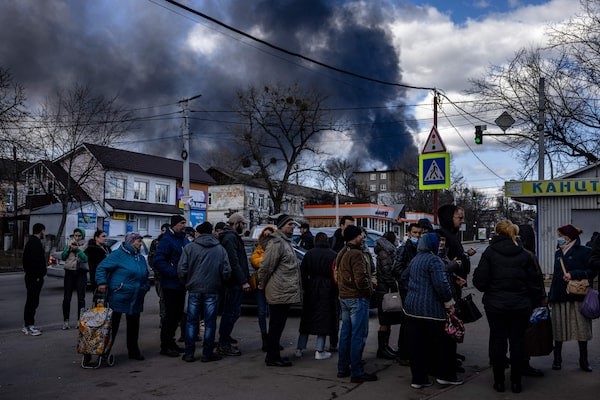
People stand in line in front of a supermarket while smoke billows over the town of Vasylkiv, just outside of Kyiv, on Feb. 27.DIMITAR DILKOFF/AFP/Getty Images
8:37 a.m. ET
Belarus holds referendum to renounce non-nuclear status
Belarus held a referendum on Sunday to adopt a new constitution that would ditch its non-nuclear status at a time when the country has become a launchpad for Russian troops invading Ukraine and marching on Kyiv.
The vote, almost certain to pass under the tightly controlled rule of President Alexander Lukashenko, could see nuclear weapons on Belarusian soil for the first time since the country gave them up after the fall of the Soviet Union.
It raises the stakes at a time when Lukashenko has fallen behind Russian President Vladimir Putin’s military assault on Ukraine after earlier playing an intermediary role between the two neighbours.
On Sunday, speaking at a polling station, Lukashenko said that he could ask Russia to return nuclear weapons to Belarus.
“If you (the West) transfer nuclear weapons to Poland or Lithuania, to our borders, then I will turn to Putin to return the nuclear weapons that I gave away without any conditions,” Lukashenko said.
-Reuters
8:01 a.m. ET
EU foreign ministers will adopt Russia sanctions later on Sunday, Borrell says
European Union foreign ministers will adopt a third round of sanctions on Russia at a virtual meeting later on Sunday, chief EU diplomat Josep Borrell said.
The measures will include the exclusion of some Russian banks from the global payment system SWIFT, he said on Twitter.
-Reuters
7:14 a.m. ET
Israeli PM offers to mediate to stop Ukraine hostilities, Kremlin says
Israel’s Prime Minister Naftali Bennett offered his country’s services as a mediator to bring peace to Ukraine in a telephone conversation with Russian President Vladimir Putin on Sunday, the Kremlin said in a statement.
It said the conversation had been an Israeli initiative and that Putin told Bennett that Russia had its delegation in the Belarusian city of Gomel ready to negotiate with Kyiv, but the Ukrainian side had “not seized the opportunity, in a show of incoherence.”
Ukraine rejected the offer, saying Belarus had been complicit in the invasion. Ukraine was happy to hold talks elsewhere, President Zelensky said.
Israel is sending 100 tons of humanitarian aid to assist civilians caught up in the fighting in Ukraine.
Naftali Bennett told a meeting of his Cabinet Sunday that the aid includes medical equipment and medicine, tents, sleeping bags and blankets.
-Reuters, Associated Press
7:11 a.m. ET
Ukraine lodges case against Russia at world court
AMSTERDAM - Ukraine has filed a suit against Russia at the highest U.N. court in The Hague for disputes between states, President Volodymyr Zelensky said on Sunday.
It was unclear on precisely what grounds the case was being brought to the International Court of Justice (ICJ). A court official could not immediately be reached for comment.
“Ukraine has submitted its application against Russia to the ICJ,” Zelensky said on Twitter. “Russia must be held accountable for manipulating the notion of genocide to justify aggression. We request an urgent decision ordering Russia to cease military activity now.”
The court does not have automatic jurisdiction in cases involving the two nations and Kyiv would have to base its claim on a U.N. treaty in order to give the court authority to hear the matter.
- Reuters
6:56 a.m.
Ukraine’s Zelensky says he spoke to Belarus’ Lukashenko
MOSCOW - Ukrainian President Volodymyr Zelensky said on his Telegram channel that he had spoken with Belarus’ leader Alexander Lukashenko, after Kyiv had rejected talks in Belarus, accusing it of allowing Russian troops through its territory.
He provided no further details so far.
- Reuters
6:43 a.m. ET
Russia warns assistance to foreign state can be treason
MOSCOW - The Russian state prosecutor’s office said on Sunday that anyone providing financial or other assistance to a foreign state or international organization aimed against Russia’s security could be convicted of treason, facing a maximum sentence of 20 years.
“Each fact of providing financial or other assistance … will be legally evaluated,” it said in a statement on the fourth day of what Russia describes as a military operation in Ukraine.
- Reuters
6:38 a.m. ET
Japan joins U.S., others in excluding Russia from SWIFT system
Japan will join the United States and other Western countries in blocking certain Russian banks’ access to the SWIFT international payment system, Prime Minister Fumio Kishida said on Sunday, following Russia’s invasion of Ukraine.
Tokyo will put sanctions on Russian President Vladimir Putin and extend $100 million in emergency humanitarian aid to Kyiv, Kishida told reporters.
“This Russian invasion of Ukraine is a unilateral attempt to change the status quo and shakes the international order to its core,” Kishida said.
“We must remain united and take action resolutely.”
SWIFT is a secure messaging system that facilitates rapid cross-border payments, making international trade flow smoothly and transferring trillions of dollars each year in what has become the principal mechanism for financing international trade.
Kishida’s decision came after the U.S. and its allies took a similar step on Saturday, a move seen to deal a blow to Russian trade and make it harder for Russian companies to do business.
-Reuters
6:34 a.m. ET
‘Heartbroken’ Pope urges help for Ukraine, condemns warmongers
VATICAN CITY - Pope Francis on Sunday called for humanitarian corridors to help refugees out of Ukraine and said those who make war should not be deluded into thinking that God is on their side.
As some in his audience at St. Peter’s Square held large Ukrainian flags, Francis said his “heart is broken” and suggested a day of prayer and fasting for peace on Wednesday.
“Those who make war forget humanity. It does not come from the people,” he said in a passionate voice.
“They don’t consider the everyday lives of people but put partisan interests before everything and trust in the diabolic and perverse logic of weapons, which is the furthest thing from God’s mind.”
The pope said he was moved by images of elderly people seeking refuge and mothers escaping with their children.
“They are brothers and sisters, for whom we must urgently open humanitarian corridors. They must be welcomed,” he said.
“May the weapons fall silent. God is with the peacemakers, not with those who use violence … It is the people who are the real victims, who pay for the folly of war with their own skin.”
- Reuters
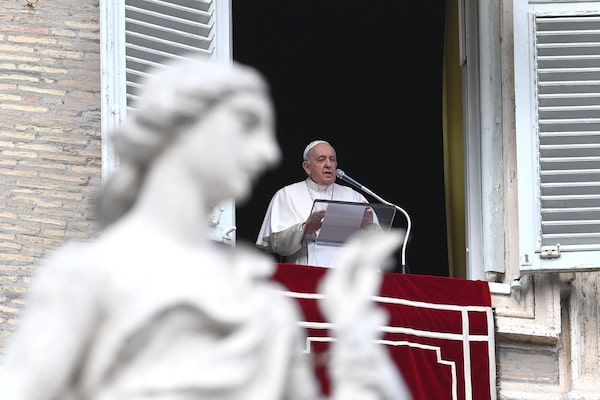
Pope Francis delivered his Angelus prayer from the window of his study overlooking St. Peter's Square at the Vatican on February 27, 2022.VINCENZO PINTO/AFP/Getty Images
6:26 a.m. ET
Ukraine has full control of Kharkiv, regional governor says
Ukrainian forces battled Russian troops pushing into the city of Kharkiv on Sunday on the fourth day of an invasion that has shaken Europe’s long-standing security architecture and pushed Germany to spend more on defense.
The invasion of Ukraine from three sides ordered by Russian President Vladimir Putin is the biggest assault on a European state since World War Two.
The attack, which Russia calls a special operation, has so far failed to topple the government in Kyiv or take major cities, but has driven hundreds of thousands of refugees, mainly women and children, into neighboring countries.
Russian soldiers and armored vehicles entered the northeastern city of Kharkiv and firing and explosions could be heard, witnesses said. A burning tank was visible in a video posted by the government.
Ukraine’s fighters repelled the attack, according to authorities in the city, the country’s second largest with a population of about 1.4 million people.
“Control over Kharkiv is completely ours! The armed forces, the police, and the defense forces are working, and the city is being completely cleansed of the enemy,” regional Governor Oleh Sinegubov said.
Reuters was unable to immediately corroborate the information.
The Russian troops blew up a natural gas pipeline in Kharkiv before daybreak, a Ukrainian state agency said, sending a burning cloud up into the darkness.
Both Ukraine’s gas pipeline operator and Kremlin-controlled energy giant Gazprom said the transit of Russian gas via Ukraine, vital for Europe’s energy needs, was unaffected.
-Reuters
5:33 a.m. ET
Judo federation suspends Putin’s honorary status
Russia’s President Vladimir Putin has temporarily lost his most senior official position in world sports.
The International Judo Federation on Sunday cited “the ongoing war conflict in Ukraine” for suspending Putin’s honorary president status.
The Russian president is a keen judoka and attended the sport at the 2012 London Olympics.
The judo federation is rare among Olympic sports bodies for using the word “war” to describe Russia’s invasion of Ukraine ordered by Putin since Thursday. Others have used phrases such as “escalation of conflict.”
- The Associated Press
2:07 a.m. ET
Ukraine to establish foreign legion for volunteers from abroad
Ukraine is establishing a foreign “international” legion for volunteers from abroad, President Volodymyr Zelenskey said on Sunday.
“This will be the key evidence of your support for our country,” Zelenskey said in a statement.
-Reuters
12:05 a.m.
ICRC urged to repatriate bodies of Russian soldiers
The International Committee of the Red Cross says it is aware of requests by Ukraine’s UN ambassador and others to repatriate the bodies of Russian soldiers killed in action in Ukraine but has no numbers.
Ambassador Sergiy Kyslytsya tweeted Saturday that Ukraine has appealed to the ICRC “to facilitate repatriation of thousands of bodies of Russian soldiers” killed during its invasion of Ukraine. An accompanying chart claimed 3,500 Russian troops have been killed.
Kyslytsya tweeted that parents in Russia should have a chance “to bury them with dignity.” “Don’t let (Russian President Vladimir) Putin hide scale of tragedy,” he urged.
Laetitia Courtois, ICRC’s permanent observer to the United Nations said the ICRC can act as a neutral intermediary on the return of bodies and other humanitarian issues in conflict.
- The Associated Press
Saturday, Feb. 26, 11:25 p.m.
Google blocks RT, other Russian state media from earning ad revenue
Google barred Russia’s state-owned media outlet RT and other channels from receiving money for ads on their websites, apps and YouTube videos, similar to a move by Facebook after the invasion of Ukraine.
Citing “extraordinary circumstances,” Google’s YouTube unit said it was “pausing a number of channels’ ability to monetize on YouTube.” These included several Russian channels affiliated with recent sanctions, such as those by the European Union. Ad placement is largely controlled by YouTube.
The EU on Wednesday announced sanctions on individuals, including Margarita Simonyan, whom it described as RT’s editor-in-chief and “a central figure” of Russian propaganda.
Videos from the affected channels also will come up less often in recommendations, YouTube spokesperson Farshad Shadloo said. He added that RT and several other channels would no longer be accessible in Ukraine because of a Ukrainian government request.
Meta Platforms Inc, owner of Facebook Inc., on Friday barred Russian state media from running ads or generating revenue from ads on its services anywhere in the world.
- Reuters
11:08 p.m.
Elon Musk says Starlink active in Ukraine as Russian invasion disrupts internet
SpaceX billionaire Elon Musk said on Saturday that the company’s Starlink satellite broadband service is available in Ukraine and SpaceX is sending more terminals to the country, whose internet has been disrupted due to the Russian invasion.
“Starlink service is now active in Ukraine. More terminals en route,” Musk tweeted.
He was responding to a tweet by Ukraine’s vice prime minister, Mykhailo Fedorov, who asked Musk to provide the embattled country with Starlink stations.
Internet connectivity in Ukraine has been affected by the Russian invasion, particularly in the southern and eastern parts of the country where fighting has been heaviest, internet monitors said on Saturday.
While extremely costly to deploy, satellite technology can provide internet for people who live in rural or hard-to-serve places where fiber optic cables and cell towers do not reach. The technology can also be a critical backstop when hurricanes or other natural disasters disrupt communication.
- Reuters
9:36 p.m. ET
Zelensky’s office reports blasts near the Zhuliany airport
Smoke and flames rise over during the shelling near Kyiv on Feb. 26, 2022GLEB GARANICH/Reuters
Huge explosions lit up the predawn sky south of Kyiv early Sunday. President Volodymyr Zelensky’s office said one of the blasts was near the Zhuliany airport, and the mayor of Vasylkiv, about 40 kilometres south of the capital, said an oil depot was hit. ”The enemy wants to destroy everything around,” said the mayor, Natalia Balasinovich.
The government warned that smoke from the huge explosion could cause an “environmental catastrophe” and advised people to cover their windows with damp cloth or gauze.
There were also reports of heavy fighting near Ukraine’s second city, Kharkiv, in the northeast, where Russian troops blew up a natural gas pipeline, a Ukrainian state agency said. The gas blast there sent a mushroom cloud up into the darkness.
Russian troops later entered Kharkiv, an interior ministry adviser, Anton Herashchenko, said on Telegram. Videos posted by him and a state agency showed several military vehicles moving on a street and, separately, a burning tank.
Russian-backed separatists in the eastern province of Luhansk said a Ukrainian missile had blown an oil terminal in the town of Rovenky.
- AP and Reuters
8:55 p.m. ET
Trump calls attack on Ukraine ‘appalling’ days after praising Putin’s actions as ‘genius’
At the CPAC conservative gathering in Florida, former President Donald Trump condemned Russia’s invasion of Ukraine and said he was praying for Ukrainians, marking a sharp shift of tone from earlier this week when he praised Russian President Vladimir Putin.
Earlier this week, Trump irked some Republican party members by describing Putin’s actions in Ukraine, where cities have been pounded by Russian artillery and cruise missiles, as “genius” and “pretty savvy.”
Addressing an adoring crowd at CPAC, Trump expressed empathy for Ukrainians and this time praised Ukrainian President Volodymyr Zelensky, calling him “brave” as he stays in Kyiv.
“The Russian attack on Ukraine is appalling. We are praying for the proud people of Ukraine. God bless them all,” Trump said.
- Reuters
5:46 p.m. ET
Canada and Western allies expel some Russian banks from global SWIFT pay system
Canada and key Western allies said they are taking steps to block Russia’s access to the SWIFT international payment system in further punitive action against Moscow for its ongoing military assault on Ukraine.
The move deals a blow to Russian trade and makes it harder for Russian companies to do business. SWIFT, or the “Society for Worldwide Interbank Financial Telecommunication,” is a secure messaging network that facilitates rapid cross-border payments, making it a crucial mechanism for international trade.
The sanctions, agreed with the United States, France, Canada, Italy, Great Britain and the European Commission, also include limiting the ability of Russia’s central bank to support the ruble.
The SWIFT measure comes one day after Prime Minister Justin Trudeau publicly called for Russia to be cut off from the international payment system.
The European Union, led by Germany, had been the most opposed. The EU trades significantly with Moscow, including importing Russian oil, gas and wheat, and making payments through SWIFT.
The SWIFT international payments system said on Saturday it was preparing to implement Western nations’ new measures targeting certain Russian banks in coming days.
Canada’s Deputy Prime Minister, Chrystia Freeland, said in a statement on Twitter that the new sanctions are aimed at sabotaging Russian President Vladimir Putin’s attack.
- Steven Chase and Robert Fife
5:15 p.m. ET
Poland opens its arms and heart to Ukrainians fleeing the Russian invasion
The gymnasium at School No. 11 in central Przemysl piled with bags of donated food and clothing for refugees from Ukraine.Anna Liminowicz/The Globe and Mail
After initially hesitating to mass-mobilize in support of refugees, Poland has opened its arms and hearts to Ukrainians fleeing the Russian invasion. The Polish government said that more than 115,000 Ukrainians have entered the country. Most came through Przemysl, the largest city next to the border.
Two days ago, only one city official and a handful of volunteers, mainly from the local Ukrainian cultural centre, were on hand to help hundreds of refugees who arrived from Lviv and Kyiv. There was hardly any food available and only a scattering of folding beds.
By Saturday, the centre was teeming with activity and full of tables loaded with donated food, water, sandwiches, snacks and children’s toys. At one point a truck arrived with boxes of baked goods, and several volunteers moved among the refugees offering free rides across Poland and throughout the European Union. Several city officials were working feverishly to prepare for more than 8,000 refugees who were expected Saturday night.
- Paul Waldie in Przemysl, Poland
2:57 p.m. ET
Russia’s propaganda machine wages information warfare over Ukraine
With Russia’s troops dying in fierce battles against Ukrainian soldiers and civilians, Moscow is choking the flow of outside information to Russian citizens and filling the void with news reports of sunny successes in a conflict that, official Kremlin narratives say, is not a war.
Russia’s official narrative, which its media have been ordered to transmit, is that it is performing a necessary liberation of Ukraine, with a military operation that has spared civilians and secured the “peaceful surrender” of cities like Melitopol, in the country’s east.
In reality, Russian forces have encountered intense fighting across Ukraine that has limited their advances and exacted a heavy toll in lost armour and lives – including in Melitopol, which British officials said Saturday had not actually been captured by Russia.
- Nathan VanderKlippe in Chisinau, Moldova
12:52 p.m. ET
Expel Russia’s envoy from Canada, recall ours from Moscow, Conservatives urge Trudeau
Oleg Stepanov is Russia's envoy to Canada.Dave Chan/The Globe and Mail
Canada should expel Russia’s ambassador in Ottawa, recall his Canadian counterpart in Moscow and revoke any broadcasting licenses for state-funded Russian media such as the Russia Today television network, the Conservative Party urged the Trudeau government on Saturday. Interim Conservative Leader Candice Bergen called the Russian invasion “a serious violation of international law and our collective humanity,” The Globe and Mail’s Steven Chase reports. She added that Canada’s response should include a rethink of defence policy in the Arctic:
It’s time to take seriously Canada’s Arctic security and sovereignty. Canada, like Ukraine, shares a border with Russia. We can no longer afford to take our peace and security for granted. The government needs to come forward with a robust plan for Canada’s Arctic that will modernize NORAD’s early warning system, among other measures.
- Globe staff
11:45 a.m. ET
Who’s laughing now? Zelensky’s journey from TV comic to wartime president
Watch excerpts from Ukrainian President Volodymyr Zelensky's Feb. 25 and Feb. 26 messages from Kyiv.
The Globe and Mail
When President Volodymyr Zelensky issued another of his signature selfie videos from Kyiv on Saturday, it was a new performance in a role few people could have imagined for him three years ago: National hero. When he first ran for office in 2019, he was best known as a TV actor whose native Russian language raised whispers about whether his allegiances were really with Moscow. Now, no one doubts what side he’s on, The Globe’s Mark MacKinnon reports in a profile of the comedian-turned-president.
Saturday morning’s video, which got three million Instagram views in an hour, promised Ukrainians that Mr. Zelensky was in Kyiv to stay and the country’s armed forces would not give up:
Lately there has been a lot of fake information online that I am calling on our army to lay down their arms and to evacuate. Listen. I am here. We are not going to lay down anything. We will protect our country. Our weapon is truth. And the truth is that it is our land. Our country. Our children. And we will protect it. That is it. That’s what I wanted to tell you. Glory to Ukraine.
-Globe staff
-Reuters
7:34 a.m. ET
For German Chancellor Olaf Scholz, war in Ukraine is a political baptism by fire
Germany's Chancellor Olaf Scholz.Markus Schreiber/Pool via REUTERS
As the Russia-Ukraine standoff reached a crisis point late last year, Olaf Scholz – a politician few outside his native Germany had ever heard of – was just taking over Angela Merkel’s job as chancellor of Europe’s largest economy. Seemingly indifferent to the Ukraine situation at first, he was accused of being the “weak link” in the anti-Putin alliance. But his decision to stall the certification process for the Russian-built Nord Stream 2 natural gas pipeline has now struck a major blow to the Putin regime’s energy ambitions in Europe.
Eric Reguly, The Globe’s European bureau chief, took a deeper look at where Mr. Scholz came from and how he has responded to the Russian threat.
- Globe staff
